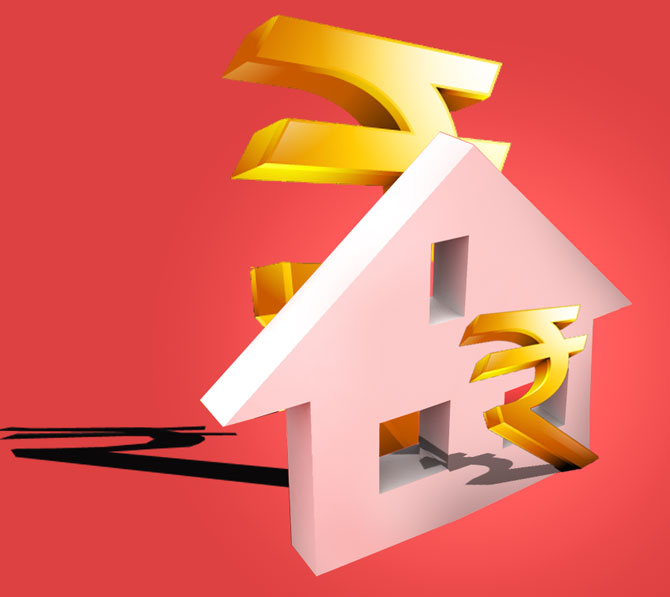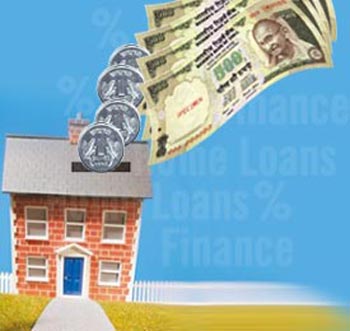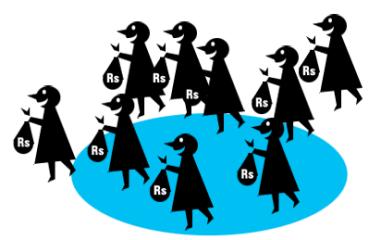Photographs: nikcname/Creative Commons Aditya Prasad
Choosing to make a partial prepayment on your loan can vastly reduce your interest burden. Find out how!
As the rupee flirts with 65 per dollar, many banks have raised their home loan interest rates. This largely impacts those who have taken a home loan in the recent past or are planning to take one on floating rate basis. When the loan is not taken on a fixed rate, such fluctuations impact buyers to a large extent.
Buying a house is top priority for most people. Also, banks today are very keen to lend to buyers hence owning a dream house is now possible without having to save large amounts of money.
The bank funds almost 80 per cent of the cost of the property, and you have to pay the remaining 20 per cent. However, while you do procure an asset, it comes attached with a liability in the form of a home loan.
While there are tax benefits that encourage opting for a home loan, one must not forget that it comes at a cost and a huge one at that. Depending on the tenure of the loan you may end up paying more than the original loan amount as interest in EMIs.
An important aspect of home loan which most people are ignorant about is the facility of part prepayment of home loan. To most home loan buyers, this facility holds relevance only when the interest rates rise and the EMI amount gets out of hand.
However, one must view this facility in a different light to see how choosing to partially prepay your loan occasionally can vastly reduce your interest burden.
Before we get into specifics, it is important to get some basics right.
The author is chief evangelist, Perfios.com
How to save BIG money on your home loan
Photographs: Rediff Archives
Part prepayment is paying additional principal over and above your existing EMI payments. The intention should be to bring down the tenure by paying off a part of the principal and not really reduce the EMI.
The implicit assumption here is that one is comfortable paying the existing EMI, there are no outstanding high cost loans such as personal loans or credit card dues and the amount accumulated is after taking into consideration the short-term liquidity needs.
So the amount is nothing but extra investible surplus you have which can either be diverted into investments or used to reduce the home loan liability.
So how does one decide whether to invest the money or reduce the loan amount?
The first step is to find out the provisions with respect to the partial prepayment facility from your home loan vendor.
Different banks have different rules with respect to partial prepayment. While most banks do not charge any prepayment penalty for part prepayments, there maybe restrictions on how much can be prepaid and how many times in a year. Making note of these is important to take a decision on part prepayment of your home loan.
How to save BIG money on your home loan
Photographs: Uttam Ghosh/Rediff.com
As a thumb rule, if you can invest your money to get a better return than the interest you are paying on your debt, you must invest that money.
In a high interest rate regime as it exists now, this may not be achievable. However, often reduction in debt is a guaranteed saving on the interest expense whereas return on investments may or may not be realised.
Prepayment of principal qualifies as a deduction under Sec 80C and hence for someone who is not utilising the total deduction of Rs 1 lakh, this would be useful.
How to save BIG money on your home loan
Photographs: Uttam Ghosh/Rediff.com
During your loan tenure, the earlier you prepay, higher are the savings in interest.
The interest component of the EMI is highest in the beginning and gradually starts reducing as the principal gets repaid. Hence for a loan, making prepayments in the first half of the total tenure makes more sense since interest savings will be the highest.
For example, for a loan of Rs 30 lakh at 11 per cent for 20 years, the total interest paid over the life of the loan assuming the same rate of interest would be Rs 44 lakh.
Let us assume 2 scenarios: prepayment of Rs 3 lakh at the end of 1 year and at the end of 5 years.
In the first case, by prepaying Rs 3 lakh at the end of 1 year, an interest amount of Rs 15 lakh is saved.
In the second case, by prepaying Rs 3 lakh at the end of 5 years, an interest amount of Rs 9.8 lakh is saved.
There is a difference of Rs 5.2 lakh in the above.
Even if we assume that Rs 3 lakh were invested for a period of 4 years in scenario 2, its returns will not be anywhere close to the amount of interest saving.
Hence one need not wait to accumulate a couple of lakh before choosing to prepay. Prepay as and how you have surplus liquidity, in early years of the loan.
How to save BIG money on your home loan
Photographs: Uttam Ghosh/Rediff.com
Will prepayment of home loan impact tax savings?
Yes, it could but remember that the interest savings will be much higher than the tax savings, especially if you prepay in the early years of the loan.
It will be worth sacrificing the tax benefit. In case of self-occupied property, since interest deduction is capped at Rs 1.5 lakh, you may be able to achieve interest savings by prepayment without impacting the tax savings.
For example, if you interest outgo in a year is Rs 3.5 lakh and prepayment reduces the yearly interest to 2.5 lakh, you still are eligible for the entire tax benefit.
The tax savings however may go down in case of let out property, and yet it is advisable to prepay.
How to save BIG money on your home loan
Photographs: Dominic Xavier/Rediff.com
You need not prepay to clear off the last rupee on the loan
A lot of people believe that they should keep prepaying till the loan becomes zero. This may not be a great idea.
The EMI schedule is structured in such a way that bank receives the bulk of the interest in the first half of the loan tenure. Hence once you have paid off good part of the loan, you can allow it to run its course, as you would be largely paying off the principal in the balance tenure and impact on interest savings will be quite low on prepayment.
Hence, surplus money can be used for prepayment keeping in mind the different aspects such as the rate of interest, balance tenure of the loan and alternate investment options available.







Comment
article